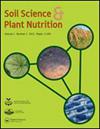Possible involvement of nitric oxide in promoting the initial growth of rice seedlings at low temperature by inoculation of Bacillus pumilus strain TUAT1 spores
IF 1.8
4区 农林科学
Q3 ENVIRONMENTAL SCIENCES
引用次数: 0
Abstract
ABSTRACT Bacillus pumilus strain TUAT1, a type of plant growth – promoting rhizobacteria (PGPR), is used as an ingredient in biofertilizer. Although we confirmed that B. pumilus TUAT1 promotes the growth of rice seedlings at 25°C, this effect has not been shown at lower temperatures. In this study, we confirmed that inoculation of rice seedlings with spores of B. pumilus TUAT1 promoted seedling emergence from soil and subsequent growth at 15°C. Except for the effect on root growth, these effects disappeared when seeds were treated with 2–4-carboxyphenyl-4,4,5,5-tetramethylimidazoline-1-oxyl-3-oxide, a nitric oxide (NO) scavenger, simultaneously with B. pumilus TUAT1 inoculation. Increased NO accumulation was detected in seed embryos 3 h after inoculation, suggesting that NO plays a role in the effects of B. pumilus TUAT1 inoculation. Transcriptome analysis using RNA-seq suggested the involvement of immune responses and cytochrome respiratory pathways in increasing NO levels in embryos after inoculation with B. pumilus TUAT1. Transcriptome analysis also indicated that transcription of genes involved in cold tolerance was accelerated in embryos following the increase in NO resulting from inoculation with B. pumilus TUAT1. These findings suggest that a novel NO signaling mechanism is involved in PGPR-induced growth promotion in plants. These results also indicate that inoculation with B. pumilus TUAT1 spores may help overcome the initial growth failure of seedlings in direct sowing culture of rice in cold regions.一氧化氮在低温下接种短小芽孢杆菌TUAT1孢子促进水稻幼苗初期生长中的可能作用
本文章由计算机程序翻译,如有差异,请以英文原文为准。
求助全文
约1分钟内获得全文
求助全文
来源期刊

Soil Science and Plant Nutrition
农林科学-农艺学
CiteScore
4.80
自引率
15.00%
发文量
56
审稿时长
18-36 weeks
期刊介绍:
Soil Science and Plant Nutrition is the official English journal of the Japanese Society of Soil Science and Plant Nutrition (JSSSPN), and publishes original research and reviews in soil physics, chemistry and mineralogy; soil biology; plant nutrition; soil genesis, classification and survey; soil fertility; fertilizers and soil amendments; environment; socio cultural soil science. The Journal publishes full length papers, short papers, and reviews.
 求助内容:
求助内容: 应助结果提醒方式:
应助结果提醒方式:


